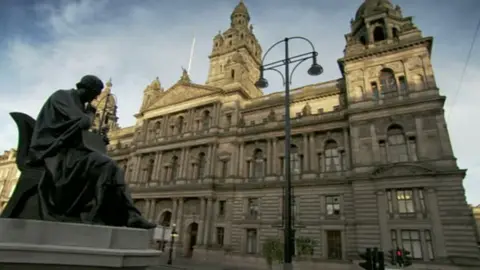Q&A: Glasgow equal pay dispute
 BBC
BBCThousands of workers in Glasgow are set to go on strike over an equal pay dispute with the city council. The GMB and Unison unions say 8,000 members will take part in the 48-hour stoppage.
What's the strike about?

The unions say their members are angry at a lack of progress in resolving an equal pay dispute which relates to a pay and benefits system introduced more than a decade ago.
After years of tribunal hearings and court judgements, the new SNP-led administration promised in January to resolve it through negotiation.
But the unions and legal campaign group Action 4 Equality say 10 months of talks, involving 21 meetings, have "gone absolutely nowhere" and that promises made within those meetings have been broken.

What does the council say?
The council had hoped to negotiate a settlement by December for the women, many of whom worked for Cordia - an arms-length company that has delivered a range of services such as home care, catering and cleaning.
Council leader Susan Aitken has said the previous Labour administration "wussed out" of doing anything about the problem while her own minority SNP administration, elected in May 2017, has "grasped the nettle".
However, she argues the strike is unnecessary and progress has been made. The council has already brought many staff working with Cordia back under direct council employment, harmonising upwards their pay and conditions.
The council has also agreed to scrap the old grading system and replace it with a completely new one. The strike, she argues, could delay negotiations.
What are the roots of the dispute?
 Getty Images
Getty ImagesThe problems arose from an earlier attempt to eliminate gender pay inequality. In 2006 Glasgow City Council adopted a job evaluation scheme with the aim of ensuring that men and women received equal pay for jobs of the same value.
While most local authorities adopted the "red book" scheme, Glasgow opted for a bespoke solution called the Workforce Pay and Benefits Review (WPBR) scheme.
There are two main problems with this:
- It included a three-year payment protection arrangement for men who lost out on bonuses as a result of the changes - but the provision was not extended to women.
- The design of the WPBR scheme itself. Staff contracted for more than 37 hours, for instance, qualified for extra payments. While women made up 70% of the council workforce, the vast majority worked fewer than 35 hours.
Campaigners say workers in traditionally female-dominated roles such as catering or home care were paid up to £3 an hour less than those in male-dominated jobs such as refuse workers or grave diggers.
In 2017, two judgements at the Court of Session ruled that both the payment protection scheme and the WPBR discriminated against women workers.
How many workers are affected?
Unions and campaigners say 12,000 workers are making equal pay claims.
Unison says it is representing 3,000 of them while the GMB says it represents 2,000 claimants.
The biggest group are represented by the campaign group Action 4 Equality Scotland, led by employment lawyer Stefan Cross. He represented many of the women who won their case against Birmingham City Council in 2013.
How much will the claims cost?
 Action 4 Equality
Action 4 EqualityLawyer Stefan Cross, from Action 4 Equality, has said it could cost Glasgow City Council between £500m and £1bn to settle the equal pay claims fully .
That figure includes years of back-pay and the extra cost of increasing pay when a new job structure is put in place.
In August council leader Susan Aitken angered the campaigners when she said these figures were "plucked out of thin air".
She says she is unable to give an estimate how much the claims could cost as the negotiations are ongoing.
Mr Cross said his team had spent hundreds of hours making detailed calculations.
He said the equal pay claims go back 12 years and they are still continuing.
The lawyer gave the example of women being "systematically" paid £4,000 a year less than men.
He said that figure alone, multiplied by thousands of women over 15 years, would give an equal pay bill of £750m.
How will Glasgow pay for the settlements?
 City of Glasgow
City of Glasgow
Glasgow City Council's leader said the payouts would have a "very significant impact on the council" for many years to come.
But she said the council was seeking to minimise the impact of jobs and services and ruled out selling off assets like Birmingham City Council did in 2013 when it was landed with a £1bn equal pay bill.
It was forced to sell off the the National Exhibition Centre to help pay its debts.
It has been suggested that Glasgow could sell off the SEC (Scottish Event Campus), which includes the Hydro Arena, or the Salvador Dali masterpiece Christ of St John of the Cross.
But Ms Aitken later told BBC Radio's Good Morning Scotland: "We have not looked at selling assets at this stage.
"We are certainly not discussing flogging off the Dali."
It has been suggested the council might receive a loan from the Scottish government to meet the cost - although the repayments would have an impact on future council budgets.
Stefan Cross acknowledges that the claims will put a strain on Glasgow, but says obligations must be fulfilled and the authority should receive help from central government if necessary.
